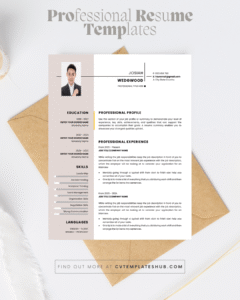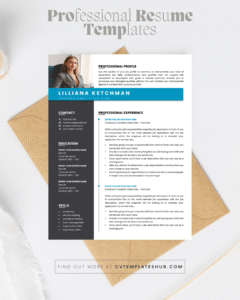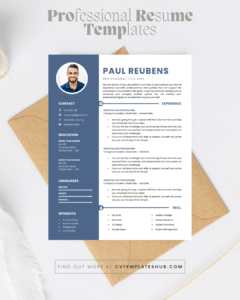How to Write a Resume: A Step-by-Step Guide for 2026
Learning how to write a resume is essential for landing your dream job. Whether you’re a recent graduate or a seasoned professional, this guide will walk you through the best resume-writing practices, industry-specific tips, and ATS-friendly formats to help you stand out.
Your resume is your first impression on a potential employer. It’s not just a document; it’s a marketing tool that showcases your skills, experience, and value. Whether you’re a recent graduate or a seasoned professional, learning how to write a resume that stands out is crucial for landing your dream job.
In this guide, we’ll walk you through the step-by-step process of crafting a professional resume, share industry-specific tips, and answer common questions to help you write a resume that gets noticed.
What Is a Resume?
A resume is a concise document that summarizes your professional qualifications, work experience, education, skills, and achievements. It’s your marketing tool, designed to demonstrate to employers why you’re the ideal fit for a job.
While a CV (curriculum vitae) is more detailed and academic-focused, a resume is tailored, brief, and targeted for specific job roles.
Why a Well-Written Resume Matters
Your resume is often the first impression a recruiter or hiring manager gets. In fact, studies show that most hiring professionals spend just 6-8 seconds scanning a resume before making a decision.
A well-structured, keyword-rich resume:
- Increases your chances of getting interview calls
- Helps you pass ATS (Applicant Tracking Systems)
- Highlights your value proposition effectively
Types of Resume Formats
Chronological Resume
This format lists work experience in reverse-chronological order. It’s ideal for professionals with a solid work history and a clear career path.
Functional Resume
Focuses on skills rather than timelines. Best suited for career changers, freelancers, or those with gaps in employment.
Combination (Hybrid) Resume
Merges both chronological and functional formats. It highlights skills at the top and follows with a work history section.
Pro Tip: Choose a format based on your career level, job type, and strengths.
How to Write a Resume (Step-by-Step)
Step 1 – Choose the Right Resume Format
Start by selecting the format that aligns with your goals. Chronological for stable history, functional for transferable skills, and combination for flexibility.
Step 2 – Start with a Strong Header
Your header should include:
- Full name
- Phone number
- Professional email address
- LinkedIn profile
- Optional: personal website or portfolio
Example:
CV Templates Hub | (123) 456-7890 | info@cvtemplateshub.com | linkedin.com/in/cvtemplateshub
Step 3 – Write a Powerful Summary or Objective
Resume Summary:
For experienced professionals. A 2-3 sentence summary that emphasizes achievements and skills.
Example:
“Results-driven marketing specialist with 5+ years of experience in digital campaigns, SEO, and brand strategy. Proven ability to grow traffic by 120% YoY.”
Career Objective:
For students or career changers. States your goals and what you bring to the role.
Example:
“Recent Business Management graduate seeking an entry-level role in digital marketing where I can apply analytical and creative skills.”
Step 4 – Highlight Your Work Experience
List your most recent role first. Include:
- Job title
- Company name
- Location
- Dates of employment
- Bullet points of achievements using action verbs
Use measurable results:
“Increased sales by 30% through targeted lead generation strategies.”
Step 5 – Add Education Details
Include your most recent education first:
- Degree
- School name
- Graduation date
- Relevant courses or honors (if applicable)
Step 6 – Showcase Relevant Skills
Divide into:
- Hard Skills: Excel, Google Analytics, Python
- Soft Skills: Communication, teamwork, adaptability
Match these with the job listing for ATS compatibility.
Step 7 – Include Certifications, Awards, or Projects
Optional but impactful section. Examples:
- Google Ads Certification
- Dean’s Honor List
- Freelance design project for XYZ company
Step 8 – Optimize for ATS and Keywords
Applicant Tracking Systems scan resumes for keywords. To pass:
- Use exact phrases from the job posting
- Avoid columns or graphics
- Use standard fonts (Arial, Calibri, Times New Roman)
Step 9 – Proofread and Customize
Before sending, ensure:
- No spelling or grammatical errors
- Tailoring to the specific job title and description
- Proper formatting (font size 11–12, 1-inch margins)
Resume Writing Tips for Different Careers
For Fresh Graduates
- Lead with education
- Add internships, part-time jobs, or volunteer work
- Use an objective instead of a summary
For Experienced Professionals
- Highlight achievements and promotions
- Add leadership roles and quantifiable results
- Keep it to 1–2 pages max
For Career Changers
- Use a functional or combination format
- Focus on transferable skills
- Explain the career change briefly in the summary
Common Resume Mistakes to Avoid
- Spelling errors and typos
- Using the same resume for all applications
- Including irrelevant or outdated information
- Overuse of buzzwords like “go-getter” or “team player”
- Ignoring ATS optimization
Resume Example Templates
Chronological Resume Example

Functional Resume Example

Combination Resume Example

Explore more at CVTemplatesHub.com: Download editable Word resume examples for any career stage.
FAQs
1. What should I write in my resume summary?
Write 2–3 concise lines summarizing your top achievements, skills, and what you bring to the specific role you’re applying for.
2. How do I describe work experience on a resume?
Use bullet points that start with action verbs. Focus on results, such as “increased engagement by 40%” or “streamlined operations saving 10 hours/week.”
3. How do I make my resume ATS-friendly?
Avoid fancy formatting. Stick to plain text, job-specific keywords, and structured headings. Use .docx or PDF format.
4. How long should a resume be?
- Entry-level: 1 page
- 5–10 years experience: 1–2 pages
- Academic or technical fields: Up to 2 pages
5. Should I include a photo on my resume?
Only if applying in a region where it’s expected (e.g., parts of Europe or Asia). For most jobs, especially in the U.S. or Canada, photos are discouraged.
Final Thoughts
Learning how to write a resume is an essential skill in today’s competitive job market. Whether you’re entering the workforce, switching careers, or looking for your next big role, a well-crafted resume can make all the difference.
Take time to tailor each section, optimize for ATS, and proofread before hitting send. Need a head start? Explore our wide range of editable Word resume templates at CV Templates Hub – designed to save you time and land interviews faster.
Ready to Start?
- Explore ready-to-edit templates on CVTemplatesHub.com
- Customize your Word resume in minutes
- Submit confidently and get noticed
